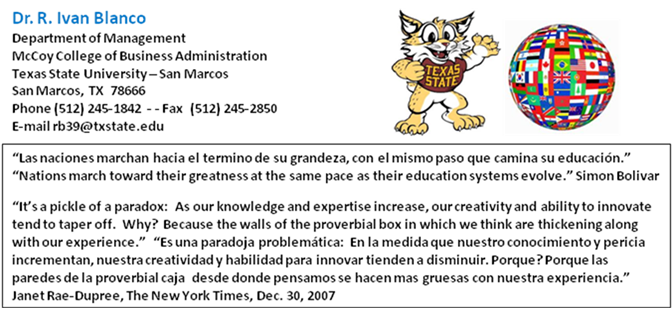Dr. R. Ivan Blanco
Department of Management
McCoy College of Business Administration
Texas State University - San Marcos
San Marcos, TX 78666
Phone (512) 245-1842 [log in to unmask]
From: Ghoshal, Animesh [[log in to unmask]]
Sent: Friday, June 15, 2012 5:09 PM
To: [log in to unmask]
Subject: Re: [AIB-L] FW: [AIB-L] Perpetuating falsehoods: The Chevrolet Nova sold poorly in Spanish-speaking countries because its name translates as "doesn't go" in Spanish
Thank you, Romie and Tunga, for alerting us to the possibility that some of the “facts” used textbook discussions of the cultural aspects of international business are not quite factual.
I wonder if anyone has investigated the claim that the Ford Pinto had to be renamed in Brazil after Ford realized that in Portuguese slang pinto is a small male appendage. Is this also an urban legend?
Animesh Ghoshal
From: Kiyak, Tunga [mailto:[log in to unmask]]
Sent: Friday, June 15, 2012 4:08 PM
To: [log in to unmask]
Subject: Re: [AIB-L] FW: [AIB-L] Perpetuating falsehoods: The Chevrolet Nova sold poorly in Spanish-speaking countries because its name translates as "doesn't go" in Spanish
I number of us had engaged in a similar discussion back in May 2002 on Global Interact Network (GINLIST – a now defunct discussion list). There were several translation examples that we discussed as urban legends; the Chevy Nova example, the Coca-Cola being translated into Chinese as "bite the wax tadpole", and Pepsi’s campaign in Taiwan being translated as "Pepsi will bring your ancestors back from the dead" as well as others.
A few of us tried to track the citations in the textbooks to their original sources and quickly went nowhere. At the end, we found several books that simply cited each other or mentioning these cases as anecdotes without any credible references. The earliest mention of the Chevy Nova ‘blunder’ we could find was a WSJ article from January 13, 1977 written by a staff reporter discussing the business of technical translation. The conclusion of the discussion was that these are all urban legends that have been victims of ‘consensual validation’. Once a first few cites came up, lazy writers who only do cursory research use those citations as validation of the statement as a fact and publish them. Additional such publications only strengthen the false validation process.
What’s so surprising is that the Snopes article was already up online in 2002, so the case has been researched and classified as urban legend for at least a decade. Yet it continues to be mentioned frequently as a brand blunder.
Tunga
--
Tunga Kiyak, Ph.D.
Managing Director
Academy of International Business (AIB)
From: Blanco, R Ivan [mailto:[log in to unmask]]
Sent: Friday, June 15, 2012 15:47
To: [log in to unmask]
Subject: [AIB-L] FW: [AIB-L] Perpetuating falsehoods: The Chevrolet Nova sold poorly in Spanish-speaking countries because its name translates as "doesn't go" in Spanish
Romie,
Finally someone writes about this myth! I have been saying the same for a long time to my students in International Business and Cross-Cultural Management because all textbooks use that as an example of blunders in language, and the Nova thing became a classic which no one had questioned before. I lived in Venezuela during the introduction of the Chevy Nova and it was a very well accepted car in that market as mentioned in your e-mail. I have said to my students and to anyone else willing to listen that in Spanish speaking countries “nova” will be associated more with the word “nuevo” (which means new), because the Latin root of “Nuevo” is pretty close to “Nova.”
Thanks for sharing!
Ivan Blanco

From: Romie Littrell
[mailto:[log in to unmask]]
Sent: Thursday, June 14, 2012 3:35 PM
To: [log in to unmask]
Subject: [AIB-L] Perpetuating falsehoods: The Chevrolet Nova sold poorly in Spanish-speaking countries because its name translates as "doesn't go" in Spanish
|
A False Claim: The Chevrolet Nova sold poorly in Spanish-speaking countries because its name translates as "doesn't go" in Spanish.
|
____
AIB-L is brought to you by the Academy of International Business.
For information:
http://aib.msu.edu/community/aib-l.asp
To post message: [log in to unmask]
For assistance: [log in to unmask]
AIB-L is a moderated list.